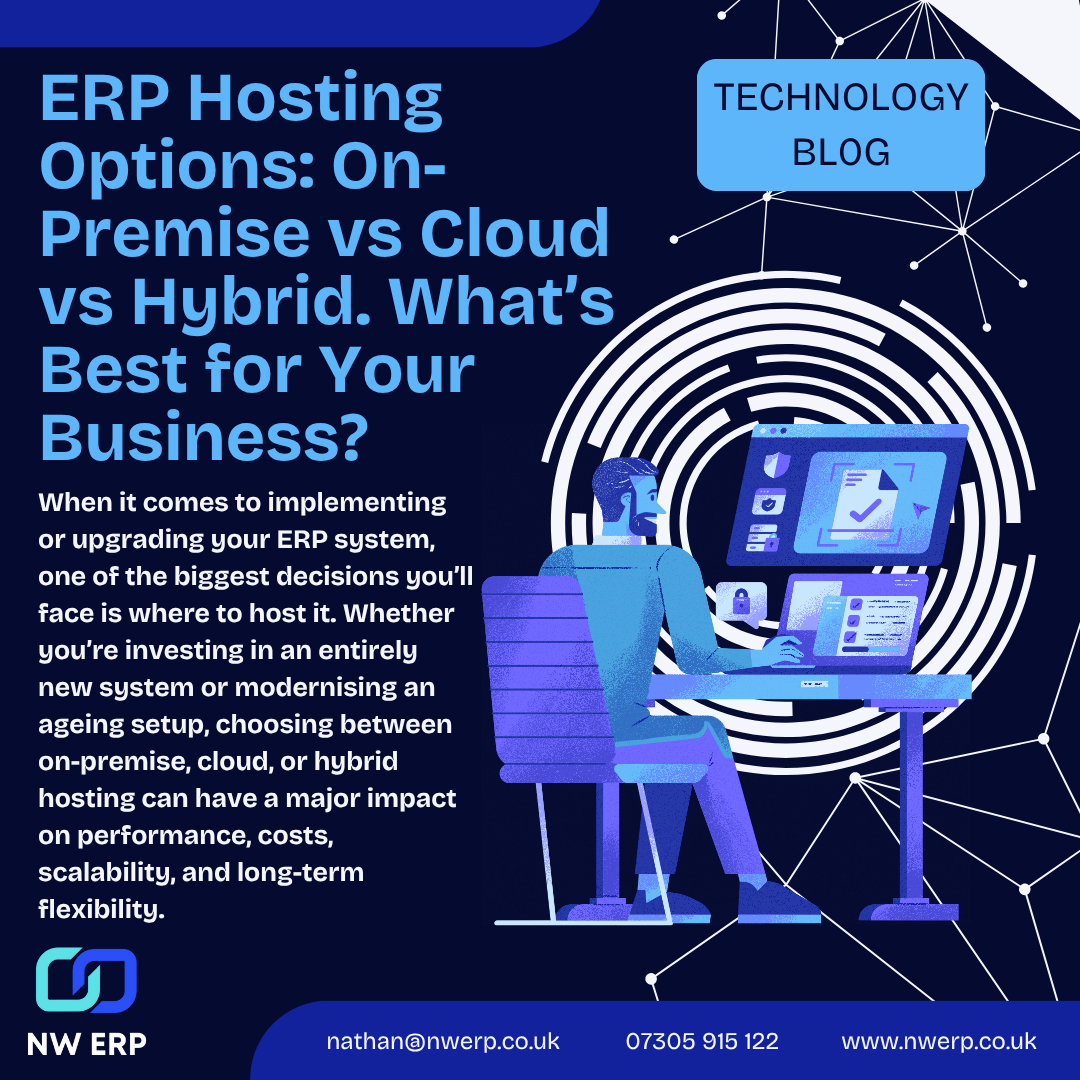 21 October, 2025
21 October, 2025
When it comes to implementing or upgrading your ERP system, one of the biggest decisions you’ll face is where to host it. Whether you’re investing in an entirely new system or modernising an ageing setup, choosing between on-premise, cloud, or hybrid hosting can have a major impact on performance, costs, scalability, and long-term flexibility.
We’ve seen clients across manufacturing, print, retail, and distribution sectors grapple with this exact decision, so here’s a balanced look at the pros and cons of each approach.
Overview:
With an on-premise ERP, all software and data are hosted on servers physically located within your business. You own and manage the hardware, software licences, security, and maintenance.
Pros:
Cons:
Long-term consideration:
While on-premise can feel like a one-time investment, ongoing support contracts, electricity, cooling, and replacement hardware add up. Over a 5/10 year period, total cost of ownership (TCO) is often higher than initially expected.
Overview:
With a cloud-based ERP, your system runs on infrastructure hosted by a cloud provider (e.g., AWS, Azure). You access it via the internet, and the provider handles hardware, uptime, and security.
Pros:
Cons:
Long-term consideration:
Cloud hosting offers predictability and low maintenance, but businesses needing advanced customisation or integrations may find shared environments restrictive. It’s important to confirm what level of access your ERP provider allows before committing to a cloud-only model.
Overview:
Hybrid ERP systems combine on-premise and cloud elements. For example, core ERP modules might run on your local servers, while reporting, e-commerce, or mobile apps are hosted in the cloud.
Pros:
Cons:
Long-term consideration:
Hybrid systems can be a sensible middle ground, particularly for businesses with bespoke modules or regulatory needs, but they demand careful design and ongoing technical management.
| Hosting Type | Key Benefits | Drawbacks | Best For |
|---|---|---|---|
| On-Premise | Full control over data and infrastructure. High performance without internet dependency. Ideal for strict compliance environments. | High upfront cost and ongoing maintenance. Requires in-house IT expertise. Hardware upgrades every few years. | Businesses with strong IT teams and strict data governance requirements. |
| Cloud | Low initial investment. Automatic updates and managed backups handled by your provider. Scalable and accessible from anywhere. | Limited customisation and integration options on shared servers. Recurring subscription costs. Possible storage or bandwidth bottlenecks. | Businesses prioritising flexibility, remote access, and minimal IT overhead. |
| Hybrid | Mix of control and scalability. Supports phased cloud migration. Built-in redundancy and disaster recovery options. | More complex to manage. Dual cost model (CAPEX + OPEX). Requires careful system integration. | Organisations needing a balance of control, flexibility, and gradual transition to cloud. |
Choosing where to host your ERP system is about more than just where your data sits, it’s about how your business will grow, scale, and adapt in the years ahead.
Ultimately, the right solution depends on your infrastructure, compliance needs, and strategic direction.
We help businesses evaluate these options based on real-world needs, not vendor bias. Whether you’re upgrading an aging server setup or exploring a move to the cloud, we’ll help you design a hosting strategy that supports your long-term goals.
Book a discovery call to discuss your ERP hosting options and get tailored advice for your business.
For more information, here are some helpful links:
Have questions about optimising your business with ERP, SaaS, Ecommerce or automation? Looking for ways to cut costs, improve efficiency, or enhance customer service.
Contact us today to discuss your needs and discover how we can help your business thrive.
No Obligation – Just a friendly chat to explore possibilities.
